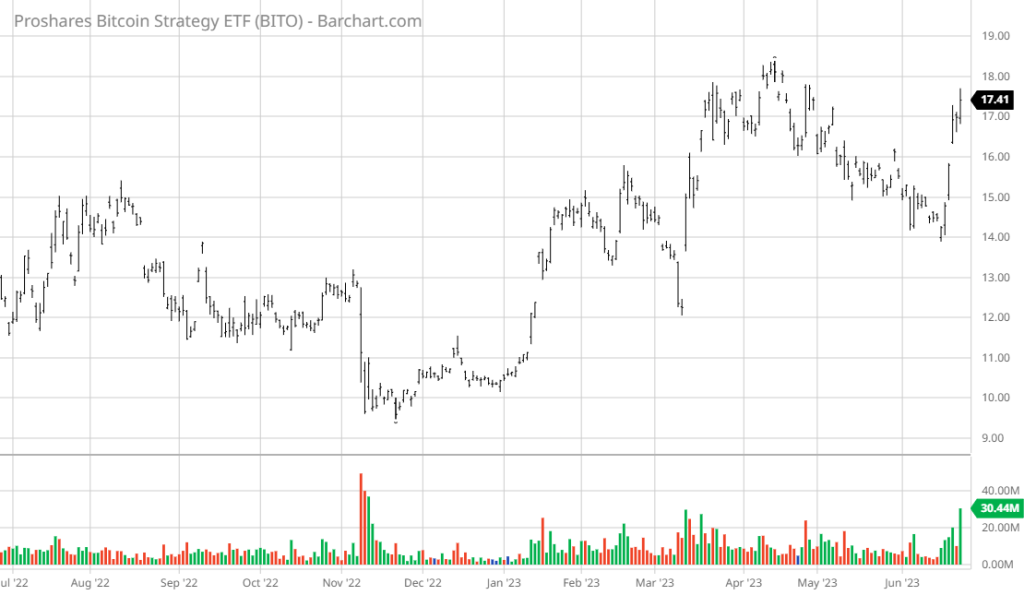Another first for Bitcoin this week. The first leveraged bitcoin futures exchange-traded fund (ETF) went into effect on Friday, as it was not blocked by the U.S. Securities and Exchange Commission (SEC).
The Volatility Shares 2x Bitcoin Strategy ETF, also known as BITX, is scheduled to start trading on Tuesday, according to Stuart Barton, Chief Investment Officer at Volatility Shares, who shared this information via email. CoinDesk was the first to report on this development.
BITX aims to offer twice the daily return of a bitcoin futures index. Instead of directly investing in Bitcoin, the fund plans to “capitalize on increases in the price of Bitcoin Futures Contracts,” as stated in its prospectus.
While the SEC has previously approved a bitcoin futures ETF, it has yet to give the green light for a spot fund. In the past week, companies like WisdomTree, Invesco, and BlackRock have all submitted applications for spot Bitcoin funds.
Investing in ETFs vs Investing in Bitcoin
A Bitcoin ETF is designed to track the value of Bitcoin. Similar to other securities and commodities, the fund holds the assets, and investors purchase a share of the overall value. By investing in a Bitcoin ETF, you gain exposure to Bitcoin’s value without directly owning any actual Bitcoin. In essence, a Bitcoin ETF consists of digital currency data rather than physical assets, offering growth potential in the current market.
Existing Top Bitcoin ETFs
| ETF | Value | |
| ProShares Bitcoin Strategy ETF | BITO | $997 million |
| ProShares Short Bitcoin ETF | BITI | $139 million |
| VanEck Bitcoin Strategy ETF | XBTF | $44 million |
| Valkyrie Bitcoin Strategy ETF | BTF | $31 million |
| Simplify Bitcoin Strategy PLUS Inc ETF | MAXI | $24 million |
| Global X Blockchain & Bitcoin Strategy ETF | BITS | $10 million |
| Hashdex Bitcoin Futures ETF (DEFI) | DEFI | $1.98 million |

About ETF Trading
Exchange-traded funds (ETFs) are a popular investment option for many investors. ETFs offer diversification and low costs, making them attractive to those looking to build a portfolio of stocks, bonds, or other securities. ETFs trade on major stock exchanges like the New York Stock Exchange and can be bought or sold intraday at different prices.
They are also tax-efficient and provide exposure to a variety of asset classes. With ETFs, investors can gain access to a wide range of markets and sectors without having to buy individual stocks or bonds. Additionally, ETFs often have lower expense ratios than mutual funds, which makes them an attractive option for cost-conscious investors. Always do your research before investing and keep in mind this is not financial advice.
Author Profile

- Ex-community moderator of the Banano memecoin. I have since been involved with numerous cryptocurrencies, NFT projects and DeFi organizations. I write about crypto mainly.
Latest entries
- June 6, 2025NewsWireElon Musk to Decommission SpaceX Dragon after Trump Threat
- December 9, 2024Stock MarketMaster the Time Value of Money Financial Concept
- November 18, 2024Stock MarketFinancial Ratios Guide to Measuring Business Performance
- November 11, 2024NewsWireLabour’s UK Budget: A Fiscal Smirk of Contempt for Working People




